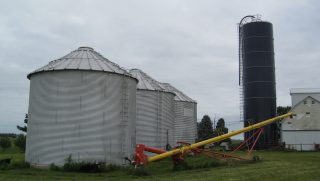Burger King is marketing a “reduced methane” burger in selected markets. How do they reduce methane? By feeding feedlot cattle 100 grams (0.22 pounds) of lemongrass per day on top of their regular feed, they claim to reduce methane “burps and farts” by 33 percent. That’s the conclusion of research Burger King funded and was conducted by the Autonomous University of the State of Mexico (“Mitigating Methane Emissions from Enteric Fermentation in Beef Cattle Using Three Herbs” by Maria Fenanda Vazquez-Carrillo, et al)
Some questions here. In the first place, what is lemongrass? Consulting Wikipedia, I find the name “lemongrass” can be applied to many species of tropical grasses of the genus Cymbopogon. One that will be familiar to everyone is Cymbopogon citratus, a chief source of citronella oil, the stuff we use to keep mosquitoes off our decks. That’s the lemongrass Burger King claims will help save the planet.
I doubt many, if any, of my readers have heard of the Autonomous University of Mexico State, or even knew there was a State in Mexico named Mexico. Its capital is Toluca, and that is where the university is located. It has a long history, founded in 1828. It is a large institution, with over 84,000 students.
Scientists there had been researching the effects of various natural ingredients added to cow diets for a decade when Burger King asked them to do research on ingredients that might reduce methane emissions. The tests were conducted on four lots of four beef animals each, three different lemongrasses, and a control group. The animals were kept in respiration chambers over the last three months of the fattening period so methane releases could be accurately measured. Difficult, I think, to extrapolate the result from four steers to a herd of thousands with any degree of certainty. A scientist at the University of California at Davis also conducted tests for Burger King with a different lemongrass sourced in California and got negligible reductions of methane.

While it’s kind of fun to be sarcastic and dismissive of Burger King’s project, there is actually lots of research, past and present, on ways to decrease methane production in ruminants. Methane is produced in the rumen by methanogens — archaea (similar to bacteria) that convert some of the products of rumen fermentation into methane which is then “burped” by the animal. This represents food energy wasted, so lots of research has been done on how to suppress methanogens without reducing rates of gain and overall feed conversion efficiency. In November 2013, a paper published in the Journal of Animal Science reviewed over 900 publications on the subject (“Mitigation of Methane and Nitrous Oxide Emissions from Animal Operation: 1. A review of enteric methane mitigation options”).
A couple of things stand out in the 2013 paper. Feeding ruminants high amounts of grain, which is done in the feedlot fattening stage, suppresses the fermentation activity of the rumen and hence suppresses methane production. Skipping the feedlot phase and finishing cattle on grass keeps the rumen running at full throttle and therefore maximizes methane production.
The other is that poor quality roughage with lots of difficult-to-digest fiber produces more methane than softer fiber. Corn silage, for instance, lowers emissions compared to grass silage. Legume silage is also better than grass silage.
Research on feed additives that suppress methanogens has been, and is, prolific. Some additives have been shown to reduce methane production by up to 50 percent but are not usable for various reasons, such as safety to the animals or the environment. Nitrates, for instance, have been shown to reduce emissions by 50 percent, but the dosage between safety and toxicity is narrow. One class of compounds that have proven effective and safe are ionophores, compounds that inhibit the transport of ions across cell walls. They do not kill bacteria or archaea, but do suppress their growth and reproduction. These compounds are therefore classified as antibiotics, but are not an antibiotic used in human medicine and are not regulated under the Veterinary Feed Directive that limits antibiotic use. The ionophore monensin is routinely used in beef production and can result in a feed to weight efficiency gain of 7 percent to 10 percent, with a corresponding reduction in methane production.
Back to Burger King’s claim of a 33 percent reduction. In a Popular Science article, (“The inconvenient truth about Burger King’s ‘reduced methane’ Whopper”, July 20, 2020), Ula Chrobak points out that the 33 percent reduction only applies to the feedlot portion of a steer’s life, which amounts to a three- to four-month period of an 18- to 24-month lifespan. Prior to the feedlot, the steers have been subsisting on forage, which results in more methane per unit of gain. So the lifetime reduction of feeding lemongrass only during the fattening period is more like 3 percent.
Jack DeWitt is a farmer-agronomist with farming experience that spans the decades since the end of horse farming to the age of GPS and precision farming. He recounts all and predicts how we can have a future world with abundant food in his book “World Food Unlimited.” A version of this article was republished from Agri-Times Northwest with permission.



